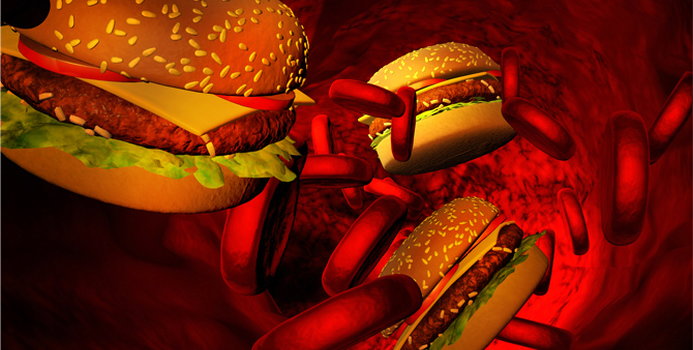Overview
Diets high in saturated fat may increase blood cholesterol levels, which in turn can clog your arteries. However, not all types of saturated fatty acids negatively impact heart health. While too much saturated fat in your diet may cause health problems, eating it in moderation as part of a well-balanced meal plan (combined with a healthy lifestyle) helps keep your arteries clear.
Causes of Clogged Arteries
Several dietary components may cause your arteries to clog, which increases your risk for heart disease. Excess saturated fat, trans fat and dietary cholesterol can build up in artery walls and harden, causing blockages. PubMed Health notes that clogged arteries often occur with older age, heavy alcohol consumption, being overweight, lack of exercise, diabetes, high blood pressure, smoking and having a family history of artery blockages. Since dietary fiber (found in fruits, vegetables, legumes, whole grains, nut and seeds) helps lower blood cholesterol, eating a low-fiber diet also puts you at risk.
Sources of Saturated and Trans Fat
Saturated fat is found in a variety of plant- and animal-based foods. It is abundant in coconut oil, palm kernel oil, palm oil and cocoa butter. It's also present in butter, cream, cream cheese, other cheeses, whole milk, ice cream and high-fat meats. Trans fat, which also contributes to clogged arteries and heart disease, is found in shortening, margarine, fried foods, doughnuts and other commercial baked goods.
Coconut Oil Benefits
Coconut oil is a plant source of medium-chained saturated fat that may actually help reduce plaque build-up in your arteries, according to a study published in 2011 in Asia Pacific Journal of Clinical Nutrition. Researchers who conducted this study found that higher coconut oil consumption was associated with increased high-density lipoprotein cholesterol, which is the beneficial "good cholesterol" that helps eliminate harmful cholesterol from your bloodstream.
Saturated Fat Controversy
Since coconut oil may play a positive role in heart-disease prevention, some researchers question whether all saturated fats are equally problematic. The University of Minnesota notes that coconut oil, palm oil and butterfat contain medium-chained saturated fat, and are metabolized in the body differently than long-chain saturated fats like beef tallow and lard. PubMed Health reports that while saturated fat does raise one type of low-density lipoprotein (LDL) cholesterol, which is known as the "bad" cholesterol," it may not affect another type of LDL cholesterol associated with heart disease.
Recommended Saturated Fat Intake
Because saturated and trans fats may clog your arteries -- and lead to unwanted weight gain -- when consumed in excess, it's important to follow guidelines when including these fats in your diet. PubMed Health suggests adult men eat no more than 30 grams of saturated fat daily, women limit their intake to 20 grams of saturated fat and all adults avoid trans fats as much as possible. The Dietary Guidelines for Americans 2010 suggest adults limit saturated fat to less than 10 percent of their total calorie intake (less than 22 grams daily when eating 2,000 calories per day), reduce trans fat as much as possible and consume no more than 300 milligrams of dietary cholesterol daily. 
An experienced health, nutrition and fitness writer, Erin Coleman is a registered and licensed dietitian and holds a dietetics degree from the University of Wisconsin-Madison. She also has worked as a clinical dietitian and health educator in outpatient settings. Erin's work is published on popular health websites, such as TheNest.com and JillianMichaels.com



